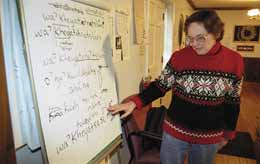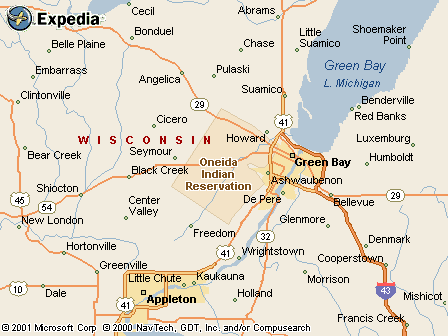|
|
Canku Ota |
|
|
(Many Paths) |
||
|
An Online Newsletter Celebrating Native America |
||
|
November 29, 2003 - Issue 101 |
||
|
|
||
|
Metoxen's history tied to the Oneidas |
||
|
by Sarah Riley - The
Green Bay News-Chronicle
|
||
|
credits: Tribal
historian Loretta Metoxen translates this Oneida language message
which means, in part, 'Went to Green Bay to buy a pizza pie.' (News--Chronicle
file photo)
|
|
Over the years, she has helped uncover stories about the tribe and its extensive history in the state. But it's her many children, 27 grandchildren and 11 great-grandchildren and the beauty of the reservation that has kept her on the reservation. "I've walked most of the reservation from one end to the other," she said. "The reservation itself is beautiful." After 16 years in the U.S. Air Force, Metoxen and her husband decided they wanted to live and raise their children close to her family in Oneida. "I mainly determined that they needed to know their family," she said about her children. "I grew up on a farm and my family kept the farm - for nearly 55 years." Metoxen's family's farm was a stage coach stopping point between Oneida and the Chicago Corners area. Walkers and riders often stopped at the house for a break and a warm drink, so the family got to know most people in the area. "It was really convenient to stop at our place, so I got to know everybody," she said. Those people turned into a built-in support system for Metoxen and her family as they built their life here. Metoxen started working at the Oneida Cultural Center in 1996. She was first elected to a tribal position in 1967. "And I stayed involved with tribal politics for the next 29 years," she said. Among many other things, the cultural center tracks the tribe's movement from New York in 1863 to its current band of 15,000 in Wisconsin. The tribe was removed from the state so the government could build the Erie Canal and other structures, Metoxen said. When members of the tribe arrived in Oneida over the span of 20 years, they built a settlement and prospered. White pine trees were used to build structures and fields were cleared for farming. "They did well when they arrived," she said. The Dawes Allotment Act took that away in 1887 by sectioning off tribal land for individuals instead of the tribe as a whole. "They lost all their land by 1929," the year the Great Depression started. The tribe lost its strength as a group for many years afterward, Metoxen said. "Everyone was in poor circumstances, but the Oneidas were worse off than most," she said. Many men and women enlisted in the military and eventually ended up in major cities where work programs were available. Eventually, another government program would strengthen the tribe back in Wisconsin. President Lyndon Johnson's Great Society programs helped tribes organize again and other programs helped with housing. "I think that's when we got our big boost in terms of organization," she said. Relatives reconnected and started researching their ancestry back in Oneida. The funds from establishing a casino in 1988 helped even further. |
|
|
www.expedia.com |
|
|
||
|
|
||
| Canku Ota is a free Newsletter celebrating Native America, its traditions and accomplishments . We do not provide subscriber or visitor names to anyone. Some articles presented in Canku Ota may contain copyright material. We have received appropriate permissions for republishing any articles. Material appearing here is distributed without profit or monetary gain to those who have expressed an interest. This is in accordance with Title 17 U.S.C. Section 107. | ||
|
Canku Ota is a copyright © 2000, 2001, 2002, 2003 of Vicki Lockard and Paul Barry. |
||
 |
 |
|
|
The "Canku Ota - A Newsletter Celebrating Native America" web site and its design is the |
||
|
Copyright © 1999, 2000, 2001, 2002, 2003 of Paul C. Barry. |
||
|
All Rights Reserved. |
||
 Loretta
Metoxen grew up on the Oneida Reservation and after a 16-year stint
in the military, came back and threw herself fully into the politics
and history of the tribe.
Loretta
Metoxen grew up on the Oneida Reservation and after a 16-year stint
in the military, came back and threw herself fully into the politics
and history of the tribe. 